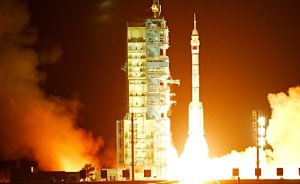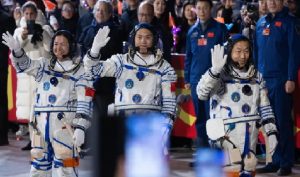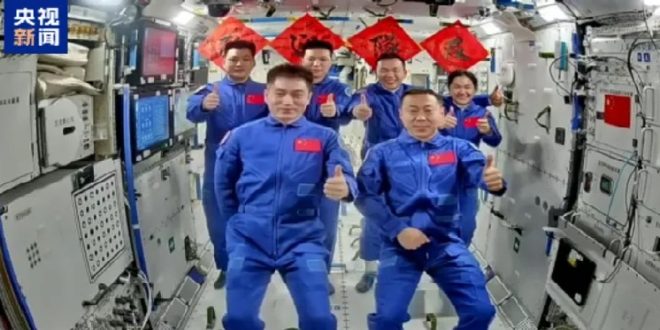01-11-2024
BEIJING: A Chinese spacecraft with a three-person crew, including the country’s first female space engineer, has docked after a journey of more than six hours.
The crew will use the homegrown space station as a base for six months to conduct experiments and carry out spacewalks as Beijing gathers experience and intelligence for its eventual mission to put someone on the Moon by 2030.
 Beijing declared the launch of Shenzhou 19 a “complete success” it is one of 100 launches China has planned in a record year of space exploration as it tries to outdo its rival, the United States.
Beijing declared the launch of Shenzhou 19 a “complete success” it is one of 100 launches China has planned in a record year of space exploration as it tries to outdo its rival, the United States.
The media was given rare access to the Jiuquan Satellite launch centre in Gansu and we were just over a kilometre away when the spacecraft blasted off.
Flames shot out of the rocket launcher as it took to the skies, lighting up the Gobi Desert with a deafening roar.
Hundreds of people lined the streets, waving and cheering the names of the taikonauts, China’s word for astronauts, as they were sent off.
At the Tiangong space station, the Shenzhou 19 crew met with three other astronauts who are manning the Shenzhou 18 and will return to Earth on 4 November.
Just two years ago, President Xi Jinping declared that “to explore the vast cosmos, develop the space industry and build China into a space power is our eternal dream”.
But some in Washington see the country’s ambition and fast-paced progress as a real threat.
Earlier this year, NASA chief Bill Nelson said the US and China were “in effect, in a race” to return to the Moon, where he fears Beijing wants to stake territorial claims.
He told legislators that he believed their civilian space program was also a military program.
‘Dreams that spark glory’
However, in Dongfeng Space City, a town built to support the launch site, China’s space program is celebrated.
 Every street light is adorned with the national flag.
Every street light is adorned with the national flag.
Cartoon-like astronaut figurines and sculptures sit in the centre of children’s parks and plastic rockets are a centerpiece on most traffic roundabouts.
A huge poster with Xi Jinping on one side and a photo of the Shenzhou spacecraft on the other greets you as you drive into the main compound.
Hundreds have gathered in the dark after midnight to wave flags and brightly colored lights as the Taikonauts make their last few steps on Earth before heading to the launch site. The brass band strikes up Ode to the Motherland as young children, kept up late for the occasion, their cheeks adorned with the Chinese flag, all shout in full song. This is a moment of national pride.
The pilot of this mission, Cai Xuzhe, is a veteran but he’s travelling with a new generation of Chinese-trained taikonauts born in 1990 including China’s first female space engineer, Wang Haoze.
“Their youthful energy has made me feel younger and even more confident,” he told the gathered media ahead of take-off.
“Inspired by dreams that spark glory, and by glory that ignites new dreams, we assure the party and the people that we will stay true to our mission, with our hearts and minds fully devoted. We will strive to achieve new accomplishments in China’s crewed space program.” Standing to his left, beaming, is Song Lingdong.
He recalls watching one of China’s first space station missions as a 13-year-old with “excitement and awe”. He chose to become a pilot in the hope that this is how he could serve his country. (Int’l News Desk)
 Pressmediaofindia
Pressmediaofindia




